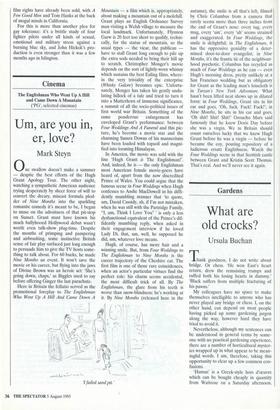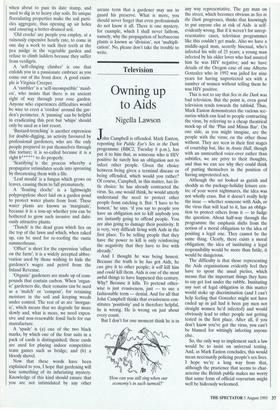Gardens
What are old• crocks?
Ursula Buchan
Tank goodness, I do not write about bridge. Or chess. 'He won East's heart return, drew the remaining trumps and ruffed both his losing hearts in dummy.' 'Black suffers from multiple fracturing of his pawns.'
My colleagues have no space to make themselves intelligible to anyone who has never played any bridge or chess. I, on the other hand, can depend on most people having picked up some gardening jargon along the way, however hard they have tried to avoid it.
Nevertheless, although my sentences can be understood in general terms by some- one with no practical gardening experience, there are a number of horticultural myster- ies wrapped up in what appear to be mean- ingful words. I am, therefore, taking this opportunity to clear up a few common con- fusions.
'Humus' is a Greek-style hors d'ceuvre which can be bought cheaply in quantity from Waitrose on a Saturday afternoon, when about to pass its date stamp, and used to dig in to heavy clay soils. Its unique flocculating properties make the soil parti- cles aggregate, thus opening up air holes and ensuring a better-drained soil.
'Old crocks' are people you employ, at a ruinously expensive hourly rate, to come in one day a week to suck their teeth at the pea midge in the vegetable garden and refuse to climb ladders because they suffer from verdigris.
A 'self-clinging climber' is one that enfolds you in a passionate embrace as you come out of the front door. A good exam- ple is Virginia Creeper.
A 'rambler' is a `self-incompatible"maid- en', who insists that there is an ancient right of way through your rose garden. Anyone who experiences difficulties would be wise to erect a 'cordon' around the gar- den's perimeter. A 'panning' can be helpful in eradicating this pest but 'whips' should only be used as a last resort.
`Bastard-trenching' is another expression for double-digging, an activity favoured by professional gardeners, who are the only people prepared to put themselves through this torture; it is so-called because it is a right b****** to do properly.
'Scarifying' is the process whereby a propagator intimidates seeds into sprouting by threatening them with a file.
'Leaf mould' is a fungus which grows on leaves, causing them to fall prematurely.
A 'floating cloche' is a lightweight polypropylene sheet laid on a garden pond to protect water plants from frost. These water plants are known as `marginals', because it is a toss-up whether you can be bothered to grow such invasive and dubi- ously attractive plants.
'Thatch' is the dead grass which lies on the top of the lawn and which, when raked up, can be used for re-roofing the rustic summerhouse.
'Offset' is short for the expression 'offset on the farm'; it is a widely accepted abbre- viation used by those wishing to hide the gardener's wages and petrol from the Inland Revenue.
'Organic' gardeners are made up of com- pounds that contain carbon. When 'organ- ic' gardeners die, their remains can be used as a 'mulch' or 'compost', for retaining moisture in the soil and keeping weeds under control. The rest of us are 'inorgan- ic', which means that we degrade far more slowly and, what is more, we need expen- sive and non-renewable fossil fuels for our manufacture.
A 'spade' is (a) one of the two black marks, by which one of the four suits in a pack of cards is distinguished; these cards are used for playing indoor competitive team games such as bridge; and (b) a bloody shovel.
Now that these words have been explained to you, I hope that gardening will lose something of its infuriating mystery. Knowledge of this kind should ensure that you are not intimidated by any other arcane term that a gardener may use to guard his preserve. What is more, you should never forget that even professionals do not know it all. There is one mystery, for example, which I shall never fathom, namely, why the propagation of herbaceous plants is known as 'division', not 'multipli- cation'. No, please don't take the trouble to write.



















































 Previous page
Previous page